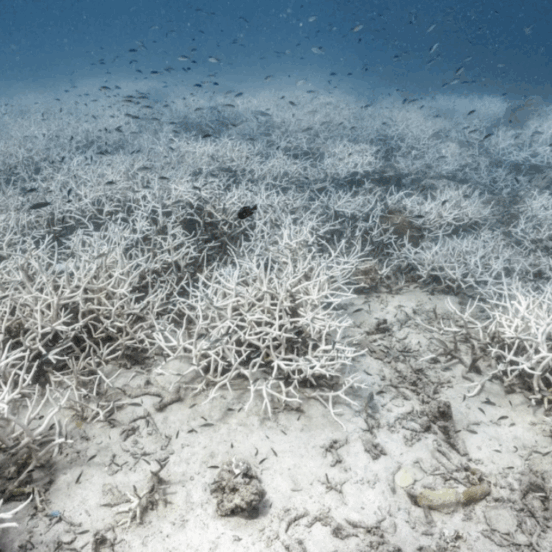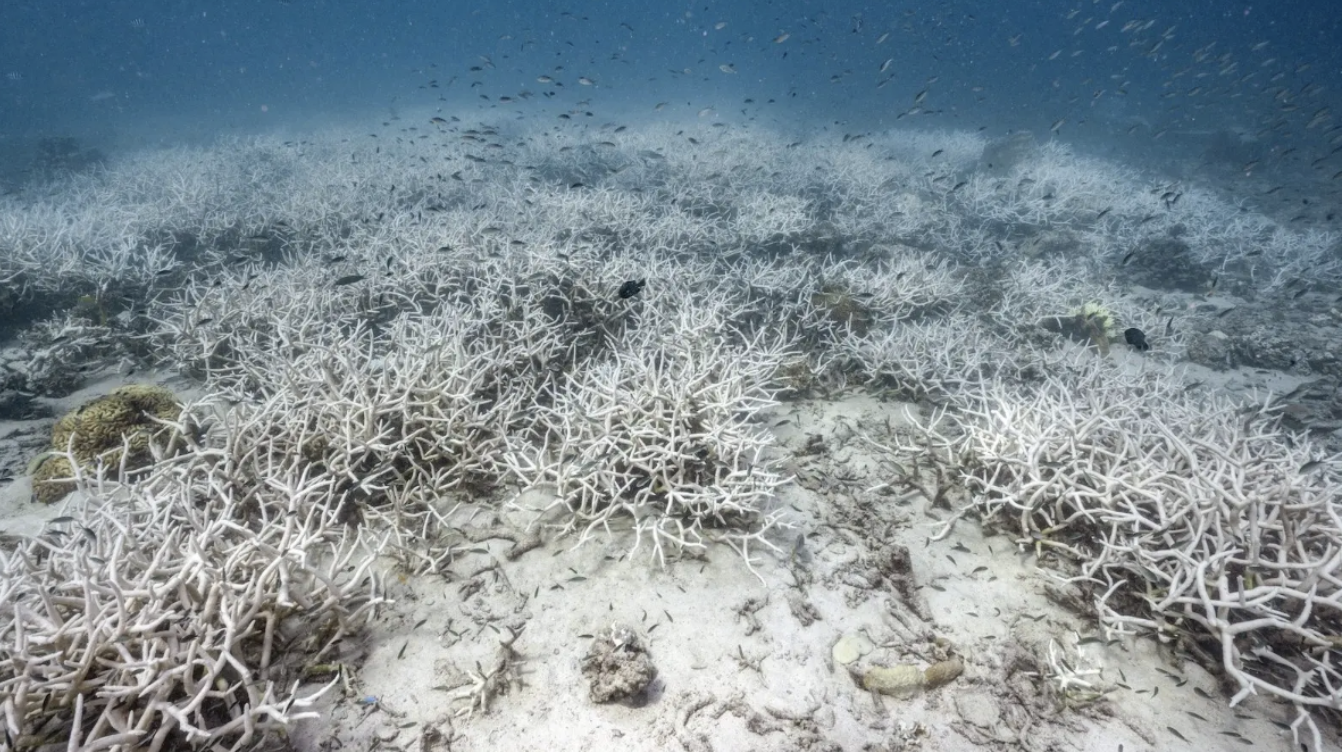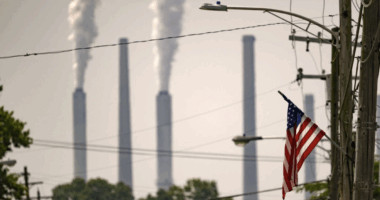Climate, Health and Equity Brief
Crossed lines and closing windows
October 24, 2025

The Climate, Health & Equity Brief is GMMB’s take on the latest news on the current impacts of climate change. If you haven’t subscribed yet, you can do so by clicking here.
Hot Topic: Tipping point. A wave of new research and record-breaking data suggest that Earth may have crossed its first major climate tipping point—a threshold at which system changes become self-perpetuating and difficult to reverse—and is approaching others.
Enter the canary in the coal mine: warm-water coral reefs. The Global Tipping Points report warns that the world’s tropical coral reefs are “on the edge of collapse,” with bleaching projected to strike nearly every year by the early 2030s if global temperatures rise beyond 1.5 °C. Once that threshold is crossed, most reefs are unlikely to recover—a loss scientists say would wipe out habitats that sustain a quarter of all marine life and support 500 million people worldwide.
In another sobering report, the UN finds that atmospheric CO₂—the largest driver of climate change—is now at its highest level in human history. Between 2023 and 2024, scientists recorded the steepest annual increase in CO₂ since measurements began in 1957, fueled by continued fossil fuel use, rising wildfire emissions, and the declining capacity of forests and oceans to absorb carbon as droughts and marine heat waves intensify.
Meanwhile, the State of Climate Action 2025 report warns that despite record clean-energy investment, the world remains off track on all 45 key climate goals, leaving the 1.5 °C target “dangerously out of reach.” The report stresses that the pace of change remains “alarmingly inadequate,” with global coal use hitting a record high in 2024, major industrial sectors growing more carbon-intensive, and nearly 20 million acres of forest lost last year—far beyond the rate needed to preserve the planet’s carbon sinks.
Yet as climate alarms blare, U.S. policymakers continue their assault. Just this week, Mr. Trump announced plans to reopen the Arctic National Wildlife Refuge to oil drilling and authorize a road through protected Alaska wilderness—a move that threatens some of the nation’s most fragile ecosystems. If fully developed, experts say the refuge could yield up to 11 billion barrels of oil, releasing more than 5 billion tons of CO₂ when burned.
The assault doesn’t stop there. In recent weeks, the Trump administration has approved roughly 300 new fossil fuel projects, canceled $8 billion in climate programs across 16 Democrat-led states, allowed higher emissions from coal plants, and moved to roll back limits on hydrofluorocarbons (HFCs)—greenhouse gases up to 1,000 times more powerful than CO₂ over a 100-year period.
The science now tells us the question is no longer when the next tipping point will come, but whether politics can change course before the planet’s systems do it for us.
Human Health
A new analysis of 43 of the world’s largest cities reveals that they are now enduring 25% more extremely hot days than in the 1990s on average, with the number of extremely hot days doubling or even tripling in some locations. (The Guardian)
A new global analysis finds that shifting to largely plant-based diets could prevent 15 million deaths a year and cut agricultural emissions by 15%, warning that without transforming the world’s food systems, the worst effects of climate change will be unavoidable. (AP News)
Planetary Health
A decade after the Paris Agreement, a major new State of Climate Action 2025 report warns that the world is failing on all key climate targets, with coal use, deforestation, and fossil fuel finance still rising despite record clean energy investment, leaving the 1.5°C goal “dangerously out of reach.” (EuroNews)
A new study found that the 2024 Amazon rainforest fires released 791 million tons of CO₂—seven times more than the previous two years—marking the first time fires surpassed deforestation as the main emissions driver and threatening a catastrophic tipping point for the region’s ecosystems. (Euronews)
The latest EU Copernicus Ocean State Report warns that the world’s ocean is in crisis, with the impacts of climate change threatening global fisheries, coastal communities, and a $2.6 trillion ocean economy that sustains 134 million jobs. (POLITICO EU)
A new report led by 160 scientists from 23 countries warns that Earth has crossed its first climate tipping point as warm-water coral reefs begin irreversible collapse from rising temperatures, acidification, and pollution. (Time)
A new study reveals that for the first time in human history, California’s Sierra Nevada glaciers are now rapidly melting and projected to disappear between 2050 and 2100. (SF Gate)
A landmark study finds that rising ocean heat is significantly depleting phytoplankton—the tiny organisms that power marine food webs and absorb vast amounts of carbon—signaling a weakening of Earth’s natural ability to regulate the climate. (The Guardian)
A new report warns that climate change and pollution are rapidly degrading Europe’s ecosystems, threatening water, food security, and economic stability as natural resources reach critical tipping points. (Reuters)
Scientists have confirmed the first-ever mosquito sightings in Iceland, one of the world’s last remaining mosquito-free regions, following record-high temperatures earlier this year. (The Washington Post)
Equity
A new report warns that wealthy nations have delivered only 4% of the $41.8 billion a year in climate aid needed for crisis-stricken East African countries, leaving a 96% climate finance gap that threatens millions already facing hunger, displacement, and water scarcity. (Global Issues, Down to Earth)
A Washington Post analysis finds that ICE detention centers face an average of 29 days of extreme heat annually—more than double that of other prisons—with the hottest 10% enduring up to 93 days annually. (The Washington Post)
Politics & Economy
Administration Watch:
- Mr. Trump announced a plan to reopen the Arctic National Wildlife Refuge to oil drilling. (The New York Times)
- The Trump administration unveiled a $625 million plan to revive coal, opening 13 million acres of federal land for mining and rolling back pollution limits. (The New York Times)
- The Trump administration canceled $8 billion in climate projects across 16 Democrat-led states, calling them part of a “Green New Scam.” (CBS News)
- FEMA is withholding over $300 million in disaster preparedness grants until states certify that their population data exclude deported immigrants. (The New York Times)
- The EPA is moving to roll back limits on hydrofluorocarbons (HFCs)—extremely powerful greenhouse gases—undermining a bipartisan plan to cut 4.5 billion tons of CO₂ by 2050. (The New York Times)
- The Trump administration approved more than 300 new oil, gas, and mining projects in the first few weeks of the government shutdown, calling the work “essential.” (The New York Times)
- The Trump administration derailed the world’s first global shipping carbon tax, stalling efforts to cut emissions from a sector producing 3% of global emissions. (CNN)
- A close friend of Vice President JD Vance with no related experience has been installed as director of the National Institute of Environmental Health Sciences without any job posting, search, or vetting process. (Inside Climate News)
- In its latest effort to censor climate language, the DOE is prohibiting words including “sustainability,” “climate change,” “decarbonization,” and “green.” (NPR)
A new report found that 43 administration nominees and appointees to key environmental and energy agencies have ties to the fossil fuel industry, including 25 (68%) of the 37 that have been confirmed by the Senate. (Inside Climate News)
More than 30 investors managing a combined $3 trillion in assets are urging global governments to end deforestation by 2030, warning that continued forest loss threatens climate stability, food and water security, and long-term financial returns. (Reuters)
The Federal Reserve, FDIC, and OCC have eliminated rules requiring big banks to assess and manage climate-related financial risks, saying existing regulations are enough, a move critics warn leaves the banking system unprepared for growing climate-driven threats. (ESG Today)
Trump’s FEMA is increasingly denying or delaying disaster aid, shifting recovery costs to states and local communities, which critics warn is leaving towns underfunded, unprepared, and forced to rebuild on their own. (The New York Times)
Action
In his first major climate speech, Pope Leo XIV condemned those who downplay climate change and urged people around the world to put increased pressure on politicians to take action. (BBC)
A new report reveals that renewable energy generation surpassed coal for the first time in history—a pivotal milestone signaling a global shift toward clean energy despite U.S. rollbacks. (The New York Times)
In its largest expansion in 20 years, UNESCO designated 26 new biosphere reserves across 21 countries, adding 8 million square kilometers of protected ecosystems that advance climate resilience and environmental stewardship. (Travel Tomorrow)
Life as We Know It
A key UK committee warned that soaring classroom temperatures—already exceeding 96.8°F in some UK schools—are undermining students’ exam performance and forcing calls for the government to prepare schools for far greater levels of warming. (The Times)
Kicker
Curious about where your state ranks in protecting public health from climate threats? Check out the new Commonwealth Fund report that gives state-by-state scorecards on environmental risks, clean energy policies, and climate resilience.
“Our planet’s vital signs are flashing red.”
-Planetary Health Check 2025
The GMMB Climate, Health & Equity Brief would not be possible without the contributions of the larger GMMB team—Catherine Ahmad, Stefana Hendronetto, Nikki Melamed, Sharde Olabanji, Kenzie Perrow, Krishna Rajpara, and Marci Welford. Feedback on the Brief is welcome and encouraged and should be sent to [email protected].




